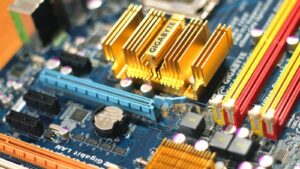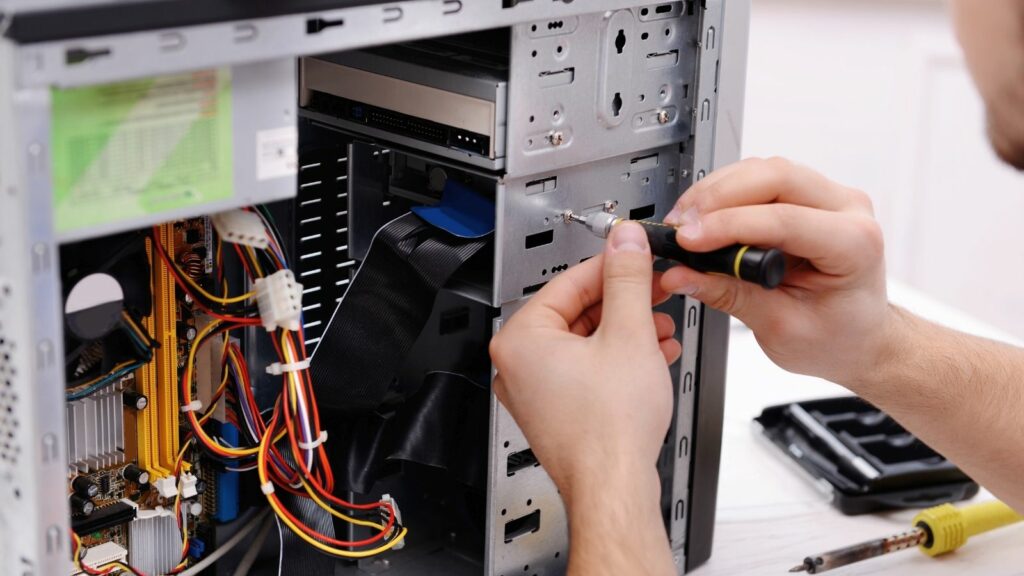”
Key Takeaways
- Educational Requirements: A bachelor’s degree in computer engineering, electrical engineering, or related fields is essential for entering the computer hardware engineering profession.
- High School Preparation: Emphasis on math, science, and technology courses during high school helps in building a solid foundation for future studies in engineering.
- Core Subjects: Key coursework includes Digital Logic Design, Microprocessor Architecture, and Circuit Analysis, essential for developing the skills needed in hardware design and testing.
- Advanced Education and Certifications: Pursuing a master’s degree or obtaining certifications like the Certified Hardware Engineer (CHE) can enhance career prospects and specialized knowledge.
- Skills Developed: Important competencies acquired through education include analytical skills, technical expertise, problem-solving abilities, and communication skills, all crucial for successful performance in the field.
- Career Opportunities: Growing demand for skilled computer hardware engineers in various sectors, including telecommunications and consumer electronics, highlights the promising career potential in this industry.
In today’s tech-driven world, the role of a computer hardware engineer is more crucial than ever. These professionals design and develop the physical components that power our devices, from laptops to smartphones. With technology advancing at lightning speed, the demand for skilled engineers continues to rise, making it an exciting career path for those interested in innovation.
To thrive in this field, a solid educational foundation is essential. Aspiring computer hardware engineers typically pursue degrees in computer engineering, electrical engineering, or related disciplines. Understanding the necessary educational requirements and skills can help individuals navigate their journey toward becoming successful engineers. With the right training and expertise, they can contribute to groundbreaking advancements in technology.
Computer Hardware Engineer Education Needed
Computer hardware engineering focuses on designing, developing, and testing computer systems and components. Engineers in this field work on a variety of devices, including personal computers, servers, and embedded systems. Specializing in hardware, they ensure compatibility with software and optimize performance.
Key responsibilities of computer hardware engineers include:
- Designing intricate schematics and layouts for electronic circuits and components.
- Developing prototypes to evaluate design concepts and performance.
- Testing hardware to identify faults and improve functionality.
- Collaborating with software developers to create integrated systems.
The field demands strong analytical and problem-solving skills. Engineers utilize various tools, such as computer-aided design (CAD) software, to streamline their design processes. Continuous education in emerging technologies ensures they remain up-to-date in a rapidly evolving landscape.
Career prospects in hardware engineering reflect growing technological needs. Companies in industries like telecommunications, automotive, and consumer electronics seek skilled engineers to enhance their product offerings. This trend aligns with the increasing integration of sophisticated hardware into everyday devices.
Educational Pathways for Aspiring Engineers
Aspiring engineers should pursue a structured educational pathway to build a solid foundation in computer hardware engineering. This pathway typically includes high school preparation followed by formal education through a bachelor’s degree.
High School Preparation
Studying mathematics and science during high school establishes crucial skills for future engineers. Students should focus on:
- Mathematics courses: Algebra, geometry, trigonometry, and calculus strengthen analytical abilities.
- Science courses: Physics enhances an understanding of electronic components and systems.
- Computer science classes: Basic programming skills provide familiarity with software development and hardware interaction.
- Elective courses: Engineering electives may introduce concepts of design and technology, fostering early interest in the field.
Participation in technology clubs or robotics competitions can further develop practical skills and teamwork.
Bachelor’s Degree Requirements
A bachelor’s degree in computer engineering, electrical engineering, or a related field offers the necessary education for hardware engineers. Key requirements include:
- Accredited programs: Attend programs accredited by the Accreditation Board for Engineering and Technology (ABET) to ensure quality education.
- Core curriculum: Complete courses in circuits, computer architecture, programming, and digital systems.
- Laboratory experience: Engage in hands-on lab work to apply theoretical knowledge and develop practical skills.
- Capstone projects: Participate in projects that involve designing, developing, and testing hardware components to gain real-world experience.
Internships during the degree program provide valuable industry experience and networking opportunities, enhancing future employment prospects.
Essential Coursework for Computer Hardware Engineers
Computer hardware engineers benefit from a strong educational background, focusing on both core subjects and elective topics. The following outlines essential coursework that supports the development of crucial skills required in the field.
Core Subjects
- Digital Logic Design: Students gain knowledge of fundamental concepts in digital systems, including logic gates, flip-flops, and finite state machines.
- Microprocessor Architecture: This subject covers the design and functionality of microprocessors, emphasizing instruction sets, data pathways, and processing speeds.
- Circuit Analysis: Learners explore the principles of electrical circuits, focusing on resistance, capacitance, inductance, and the application of Ohm’s Law.
- Electromagnetics: Understanding electromagnetic fields and their behavior in circuits is critical for designing effective hardware components.
- Signals and Systems: Students study signal processing techniques and their applications in hardware development, crucial for system integration.
- Embedded Systems: This course teaches about programming and working with microcontrollers, enabling engineers to create efficient hardware-software interfaces.
- Computer Architecture: An elective that examines advanced computer systems design, including memory hierarchy and performance optimization strategies.
- VLSI Design: This topic covers Very Large Scale Integration design techniques, allowing students to understand chip manufacturing and design.
- Real-Time Systems: Students learn about real-time computing requirements and the challenges associated with developing reliable hardware for time-sensitive applications.
- Networking Hardware: This elective focuses on the design and implementation of hardware used in networking, enhancing understanding of inter-device communication.
- Robotics: Learners explore hardware required for robotics applications, integrating mechanics, electronics, and computing.
- Sustainable Engineering: This subject covers principles of sustainability in hardware design, focusing on energy efficiency and environmentally-friendly practices.
These core and elective subjects equip aspiring computer hardware engineers with the critical knowledge and skills necessary to thrive in a technology-driven environment.
Advanced Education and Specializations
Advanced education enhances career prospects and expertise for computer hardware engineers. Completing a master’s degree or obtaining certificationscan provide an edge in this competitive field.
Master’s Degree Options
 Master’s degrees in computer engineering or electrical engineering deepen knowledge and technical skills. Graduate programs often offer specializations in areas such as embedded systems, VLSI design, or computer architecture. These programs typically require 30 to 36 credit hours and may include a thesis or capstone project. Institutions may also offer online master’s programs to accommodate working professionals. For example, programs at Georgia Tech and Stanford University are well-regarded for their rigorous curriculum and faculty expertise.
Master’s degrees in computer engineering or electrical engineering deepen knowledge and technical skills. Graduate programs often offer specializations in areas such as embedded systems, VLSI design, or computer architecture. These programs typically require 30 to 36 credit hours and may include a thesis or capstone project. Institutions may also offer online master’s programs to accommodate working professionals. For example, programs at Georgia Tech and Stanford University are well-regarded for their rigorous curriculum and faculty expertise.
Certifications and Licenses
Certifications demonstrate proficiency and expertise in specific areas of hardware engineering. Popular certifications include:
- Certified Hardware Engineer (CHE): Validates skills in designing and testing hardware components.
- Cisco Certified Network Associate (CCNA): Focuses on networking hardware, crucial for hardware engineers working in telecommunications.
- CompTIA A+: Covers fundamental hardware skills, beneficial for entry-level positions.
Licenses may be required for specific roles, particularly for engineers working on public projects. The Principles and Practice of Engineering (PE) exam certifies qualified engineers in the United States. Obtaining relevant certifications and licenses strengthens a candidate’s resume and increases job opportunities in the field.
Skills and Competencies Developed Through Education
Computer hardware engineering education equips individuals with essential skills and competencies. These abilities foster proficiency in various key areas:
- Analytical Skills
Analytical skills enable engineers to identify problems and calculate solutions effectively. Courses in mathematics and physics enhance logical reasoning and critical thinking.
- Technical Expertise
Technical expertise encompasses proficiency in relevant software tools, including computer-aided design (CAD) software. Hands-on laboratory experience further solidifies this knowledge.
- Problem-Solving Abilities
Problem-solving abilities cultivate innovative solutions to complex design challenges. Projects and case studies during coursework often require students to devise practical implementations.
- Understanding of System Integration
Understanding of system integration equips engineers with the skills to work collaboratively across disciplines. Knowledge of both hardware and software components enhances overall system functionality.
- Attention to Detail
Attention to detail ensures precision in schematic design and prototype development. This quality is crucial for minimizing errors and enhancing product reliability.
- Communication Skills
Communication skills foster effective collaboration with team members and stakeholders. Educators emphasize technical writing and presentation abilities within coursework.
- Project Management
Project management skills develop through group projects and capstone experiences. Students learn to coordinate tasks, manage resources, and meet deadlines effectively.
- Ethical Awareness
Ethical awareness encourages engineers to consider the societal impact of their designs. Integrating ethics into the curriculum promotes responsible engineering practices.
Through focused education, aspiring computer hardware engineers build a robust foundation of skills and competencies essential for success in the field.
Computer Hardware Engineer Is Both Challenging And Rewarding
The journey to becoming a computer hardware engineer is both challenging and rewarding. With a solid educational foundation and a commitment to continuous learning, aspiring engineers can position themselves for success in a fast-evolving industry.
By focusing on relevant coursework and gaining practical experience through internships, they can develop the essential skills needed for innovative design and problem-solving.
As technology continues to advance, the demand for skilled hardware engineers will only grow, making this an exciting field for those passionate about shaping the future of technology.
“



